Last week, I kicked off the latest Professional Wednesday blog post series, “My Best Mistakes,” with a humorous story about my behavior at a convention early in my career. I hope you enjoyed it.
This week, I turn to more serious matters, because the fact is certain mistakes can have serious consequences for our careers. Before I begin, let me reiterate something I wrote in last week’s post: Some of the stories I tell in this series of posts will include other people in the business and/or will touch upon published works of mine that I am still seeking to market. In the interest of discretion, I will be keeping some details purposefully vague.
The events I’m going to describe took place many years ago, as I was putting the finishing touches on one of my early epic fantasy series, and I was looking forward to my next project or projects. This is common for writers even today. We are often a book or two ahead of the publishing schedule, particularly if we publish traditionally. And so as we are waiting for the last book or two of a series to wend its/their way through the production process, we are usually turning to the new shiny. And this was especially the case back in the years I’m talking about here, when self-publishing was not yet a Thing, and big-house traditional publishing was excruciatingly slow.
I had recently met a small press publisher at a convention, and this person expressed interest in publishing my next work. This publisher was ambitious, articulate, charming, and seemed to know the business. Put another way, they talked a good game. They had some big name authors writing for them already and they made it very clear they wanted to add me to that mix. It was flattering really, and they probably knew it.
To that point in my career, I had only written for Tor Books. Tor was and is a great house. Their reputation is global, as is their marketing reach. They brought me out in hardcover with all of my early books, as they did almost all their writers. They put out a beautiful product, they took out big, glossy ads in Locus and the Science Fiction Chronicle. They hosted THE big party at WorldCon each year. There was, in short, a certain cachet that came with being a Tor author. And I liked that. On the other hand, even as my star was rising early in my career, I remained a small fish in the big pond that was Tor.
And so, being a relatively big fish in the pond of this small publisher had some appeal. Add to that the fact that this publisher offered to match or beat the numbers in my most recent contracts with Tor, which had been generous, and I was eager to give working with this person a try. Never mind that all of it sounded too good to be true. I wanted in.
I signed a contract for several books. And if the publisher needed a little extra time to come up with the promised advance . . . well, it was a small press after all. It was understandable, right?
No, not right. That was our first warning that all was not as it should be, although it shouldn’t have been.
So far, I have made it seem the only problem with the contract I signed was that the small press publisher couldn’t do all they promised financially. But there was more to this episode than that. The books I sold them weren’t ready either. The concept needed a ton of work, something I didn’t realize at the time, didn’t WANT to realize at the time. But it’s true. I would later publish a much-changed iteration of this concept with a different publisher, but back in the mid-2000s, when all of this took place, the books were a shadow of what they could and should have been. The publisher’s failure to see the flaws in the original concept should have been a warning as well.
All of that said, I eventually did get my initial advance, and I eventually turned in the first book. When I got it back from the publisher, who was now also my editor, the manuscript was very nearly unmarked. “Looks great. Found a few typos and phrases that don’t quite work. Get the revisions back to me as soon as possible.” That’s a paraphrasing of the feedback I received, but it’s an accurate one and it set off alarm bells in my mind. I knew the book needed more. I didn’t yet know how much work it needed, but I knew it wasn’t essentially publication-ready. As it turned out, this was another sign that my publisher’s resources — financial, yes, but also in terms of time and human resources — were spread way too thin.
Within eighteen months of my signing the contract, the small press was on the brink of bankruptcy. We managed to get back the rights to the series, but only because my agent and I acted quickly and decisively. The series could have gotten caught up in the bankruptcy proceedings and then we might never have been able to sell the later iteration of the books to a different publisher. The publishing company folded not too much later. As far as I know, the publisher/editor I worked with briefly is no longer connected to the publishing world.
So, what are the lessons here? Let me start by saying that the lesson is NOT to avoid working with small presses. I have worked with several in recent years and, with one other notable exception, have had great experiences. Small presses are, to my mind, the future of the industry and a wonderful option for writers of every experience level.
No, the lessons are these:
1) If the promises made to you by a publisher (or, for that matter, by an agent) sound too good, too optimistic, too perfect, take a long, close look at the contract and at all the information you can find about the enterprise. Talk to other authors who have worked with them. Learn all you can. We all like to be told what we want to hear. We all want to feel wanted by our publishers. But flattery and rosy scenarios are no substitute for solid information. Because the old adage holds true: If it seems too good to be true, it probably is.
2) Don’t rush into anything. Don’t rush to get that first contract signed, unless you’re truly confident you’re a good match for the publisher. Don’t rush to bring a book or series to press unless you’re certain it’s ready. Don’t hurry into any publishing arrangement because you need the money quickly. Actually, that’s probably good advice for any business venture in any field. But it’s particularly important when we’re peddling our intellectual and creative property. If we rush into selling, say, a car, we might not get as much as we should. But if we rush into a publishing contract we can lose access to our artistic creation. If my agent and I had waited another month or two, that’s what would have happened with this series of books. Better to be patient. Better to delay the realization of our ambitions than to destroy any chance of realizing them.
And 3) Beware, beware, beware. The vast majority of the people I know in the publishing industry — writers, editors, agents, publishers — are honest and hardworking. They are in the business because they’re passionate about books and stories, and they want to do good by the people with whom they work. But there are a few — yes, I could drop names; I won’t — who are in it to make a buck, and don’t care who they hurt along the way. There are others who through malign intent or sheer incompetence seem to turn to shit everything they touch. Before you sign to work with anyone, make certain you know what category they fall into.
Keep writing!









 During our tour, we encountered many people selling pottery in front of their homes. And at one table, a mother displayed her wares beside those of her young daughter. I think the girl must have been around 7 or 8, give or take a year, and she had made a few small bowls, seed pots, and dishes. And she had made a tiny storyteller. As one would expect, it was quite crude compared to those we had seen for sale back in Albuquerque (we hadn’t yet been to Santa Fe or Taos), but something about the figure spoke to me. Maybe is was just that the storyteller was so cute. Or maybe it was that the girl herself was so proud of it. Or maybe I saw in this child’s early effort to follow in her mother’s footsteps something akin to my dream of becoming a professional writer. Whatever the reason, I asked the girl how much it cost.
During our tour, we encountered many people selling pottery in front of their homes. And at one table, a mother displayed her wares beside those of her young daughter. I think the girl must have been around 7 or 8, give or take a year, and she had made a few small bowls, seed pots, and dishes. And she had made a tiny storyteller. As one would expect, it was quite crude compared to those we had seen for sale back in Albuquerque (we hadn’t yet been to Santa Fe or Taos), but something about the figure spoke to me. Maybe is was just that the storyteller was so cute. Or maybe it was that the girl herself was so proud of it. Or maybe I saw in this child’s early effort to follow in her mother’s footsteps something akin to my dream of becoming a professional writer. Whatever the reason, I asked the girl how much it cost. That was a magical day in many ways. Acoma was as beautiful as we had been told, the pale red stone of the Pueblo seeming to glow beneath a deep azure sky, wooden kiva ladders rising above their structures and reaching toward the clouds. At one point, I spotted a rainbow in the clouds overhead — there was no rain, just the prismatic color, which appeared for a moment and then vanished. I think I was the only one on the tour who saw it. I believed that, together, the rainbow and my little storyteller were omens, signs that my dream would, in fact, come to pass.
That was a magical day in many ways. Acoma was as beautiful as we had been told, the pale red stone of the Pueblo seeming to glow beneath a deep azure sky, wooden kiva ladders rising above their structures and reaching toward the clouds. At one point, I spotted a rainbow in the clouds overhead — there was no rain, just the prismatic color, which appeared for a moment and then vanished. I think I was the only one on the tour who saw it. I believed that, together, the rainbow and my little storyteller were omens, signs that my dream would, in fact, come to pass. Two months later, I got my first contract from Tor Books. Children of Amarid wasn’t published for another three years — that first book needed a lot of editorial work. But I was on my way.
Two months later, I got my first contract from Tor Books. Children of Amarid wasn’t published for another three years — that first book needed a lot of editorial work. But I was on my way. The first deadline I missed was on my second novel, The Outlanders, the middle book of the LonTobyn Chronicles trilogy. And I had good excuses. Between the time I started writing the book, and the day the first draft of the manuscript was due to Tor, our first child was born, my mother died, my father died, and my siblings and I had to settle my father’s estate.
The first deadline I missed was on my second novel, The Outlanders, the middle book of the LonTobyn Chronicles trilogy. And I had good excuses. Between the time I started writing the book, and the day the first draft of the manuscript was due to Tor, our first child was born, my mother died, my father died, and my siblings and I had to settle my father’s estate. Yes, sometimes we think we’re going to miss a deadline, and then we make it. And if we alert our publisher prematurely, we could lose our spot in the queue. So be it. That’s the price of acting professionally. When our older daughter first was diagnosed with cancer, I told my editor and my agent what had happened, and let them know I was probably going to be late with the novel I was writing. As it turned out, writing that book — Invasives, the second Radiants novel — was a wonderful escape, and I met my deadline. But I had given up my publishing spot and so the book was released later than I had hoped. It wasn’t that big a deal. As I say, the most important thing is be up front about the situation with those who need to know.
Yes, sometimes we think we’re going to miss a deadline, and then we make it. And if we alert our publisher prematurely, we could lose our spot in the queue. So be it. That’s the price of acting professionally. When our older daughter first was diagnosed with cancer, I told my editor and my agent what had happened, and let them know I was probably going to be late with the novel I was writing. As it turned out, writing that book — Invasives, the second Radiants novel — was a wonderful escape, and I met my deadline. But I had given up my publishing spot and so the book was released later than I had hoped. It wasn’t that big a deal. As I say, the most important thing is be up front about the situation with those who need to know. My “What matters?” series of posts will conclude next Monday, after a Monday Musings post this week that straddled the personal and professional a bit more than usual. In the meantime, I am using today’s Professional Wednesday post to begin pivoting toward the impending release of my new series, a contemporary urban fantasy that delves deeply into Celtic mythology. The series is called The Chalice War, and the first book is The Chalice War: Stone. It will be released within the next month or so, and will be followed soon after by the second book, The Chalice War: Cauldron, and the finale, The Chalice War: Sword.
My “What matters?” series of posts will conclude next Monday, after a Monday Musings post this week that straddled the personal and professional a bit more than usual. In the meantime, I am using today’s Professional Wednesday post to begin pivoting toward the impending release of my new series, a contemporary urban fantasy that delves deeply into Celtic mythology. The series is called The Chalice War, and the first book is The Chalice War: Stone. It will be released within the next month or so, and will be followed soon after by the second book, The Chalice War: Cauldron, and the finale, The Chalice War: Sword.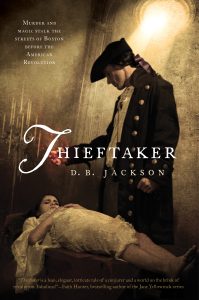 I finished the book and showed it to my agent. She liked it a lot, but thought it needed work. She was right, of course. But by that time, I had signed the contracts for Robin Hood and the Thieftaker books. Not too long after, I finally sold the Fearsson series to Baen Books and so had that trilogy to get through.
I finished the book and showed it to my agent. She liked it a lot, but thought it needed work. She was right, of course. But by that time, I had signed the contracts for Robin Hood and the Thieftaker books. Not too long after, I finally sold the Fearsson series to Baen Books and so had that trilogy to get through.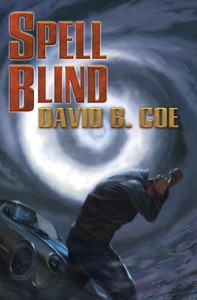 But I never forgot my Celtic urban fantasy, or its heroes Marti and Kel. When I had some spare time, I went back and rewrote the book, incorporating revision notes from friends and from my agent with my own sense of what the book needed. I rewrote it a second time a couple of years later, and having some time, started work on a second volume, this one set in Australia (where my family and I lived in 2005-2006). I stalled out on that book about two-thirds of the way in, but I liked what I had. By then, though, I was deeply involved with the final Thieftaker books and the Fearsson series. And I was starting to have some ideas for what would become the Islevale trilogy.
But I never forgot my Celtic urban fantasy, or its heroes Marti and Kel. When I had some spare time, I went back and rewrote the book, incorporating revision notes from friends and from my agent with my own sense of what the book needed. I rewrote it a second time a couple of years later, and having some time, started work on a second volume, this one set in Australia (where my family and I lived in 2005-2006). I stalled out on that book about two-thirds of the way in, but I liked what I had. By then, though, I was deeply involved with the final Thieftaker books and the Fearsson series. And I was starting to have some ideas for what would become the Islevale trilogy.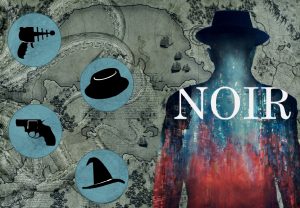 So far, we have received some very good stories. We have also received far, far more that won’t make the first cut. And so I thought I would go over again, briefly, the things that can make or break a story submission, at least for this editor.
So far, we have received some very good stories. We have also received far, far more that won’t make the first cut. And so I thought I would go over again, briefly, the things that can make or break a story submission, at least for this editor.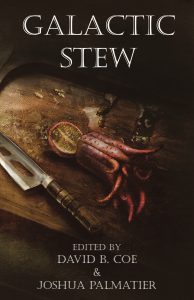 Will I reject a story simply because it is single-spaced instead of double-spaced? No, I’m not quite that mean. But when reading a story, knowing I have literally dozens more waiting in the queue, I will only tolerate so many flaws before I reject it. Remember, I have 500 stories to choose from. I can and will find what I’m looking for. No story is ever perfect, so ask yourself, do you want to expend one of your flaws on formatting? Or do you want to present your story correctly so that I can judge it on its artistic merits? The answer seems self-evident to me.
Will I reject a story simply because it is single-spaced instead of double-spaced? No, I’m not quite that mean. But when reading a story, knowing I have literally dozens more waiting in the queue, I will only tolerate so many flaws before I reject it. Remember, I have 500 stories to choose from. I can and will find what I’m looking for. No story is ever perfect, so ask yourself, do you want to expend one of your flaws on formatting? Or do you want to present your story correctly so that I can judge it on its artistic merits? The answer seems self-evident to me.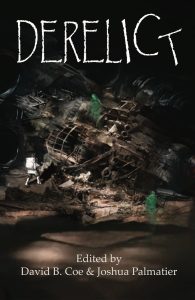 1) I abhor the cliché, but think outside the box. As
1) I abhor the cliché, but think outside the box. As